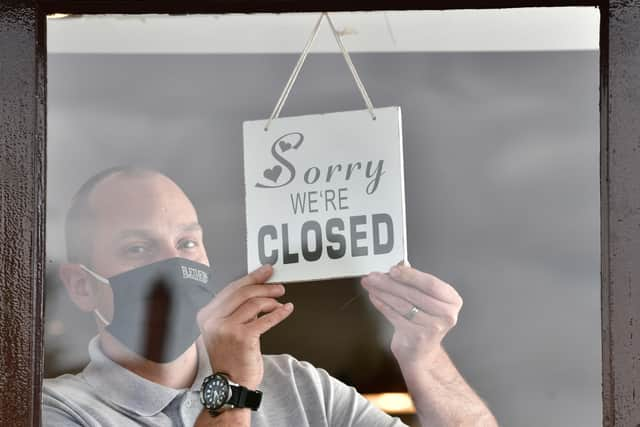Alex Kane: Note to politicians – we have been living with the virus for eight months


What the hell do they think we’ve been doing since last March?
We’ve been living with it every day – every single day – since restrictions were first introduced.
Advertisement
Hide AdAdvertisement
Hide AdWe got used to having the schools off and our children home for months on end. We got used to standing in socially-distancing queues when we went to the shops that were open. We got used to having to work from home. We got used to not seeing friends and family on a regular basis. We got used to not being able to go to clubs, restaurants, bars, cinemas. We got used to putting our usual routines on hold. We got used to a ‘new normal’; yet holding on patiently for a return to how it used to be.


And all of this required enormous personal sacrifice from every one of us. For the elderly and those who lived alone it meant huge pressure on their mental health.
For those who needed hospital provision for other ailments and treatments it meant cancelled or postponed appointments and operations. For those who did get into hospitals it meant not being able to be visited by their families.
For business owners it was the worry of whether they would survive. For employees it was whether they would still have jobs. For parents it was about their children’s education (in our case we have a playgroup child, a P7 and our eldest at university). Just about every other aspect of my life I can think of has changed over the last seven months: as it has for everyone else.
Advertisement
Hide AdAdvertisement
Hide AdWhen the restrictions began I discussed them with my partner, Kerri and we agreed that caution should be our watchword. We didn’t know more than anyone else about the virus (it took me a couple of columns before I didn’t have to double-check the spelling of key words) and decided to follow official advice – however difficult it might make our everyday lives.
If nothing else, the official advice seemed more reliable than the views of those (mostly on social media, it has to be said) who claimed the whole thing was: a) a scamdemic; b) a satanic plot (foretold in the bible) to introduce a world government; c) a capitalist plot to do away with the need for employees; d) a plot by governments to deny liberties and keep citizens under new controls; e) a plot to help pharmaceutical companies (billions of vaccines) and home delivery companies to grow their empires; and f) a plot by China to take over the world.
I’m sure most of you have read about other plots (and it always has to be described as a ‘plot’, doesn’t it?) and could add to that list.
To be fair, I do have some sympathy with those who argue that people are easily duped into doing things.
Advertisement
Hide AdAdvertisement
Hide AdLook at how many people respond to outlandish emails from African royalty offering them a share of millions of dollars if they’re willing to provide them with their account details. Look at the millions of people who retweet and ‘like’ obviously fake news stories. Look at the millions who are scammed out of huge sums of money in the modern-day equivalents of the 1720s South Sea Bubble. And let’s not forget the hundreds of thousands of Americans who started packing and fleeing their homes on October 30, 1938 when New York’s WABC (and 151 CBS affiliates across the county) broadcast Orson Welles’s Martian invasion hoax.
It is amazing what people will believe. And always has been. What is not so easy to explain is why so many people now seem prepared to believe that this particular virus is actually a cover for something else. Yet they don’t have a convincing explanation for what, in the UK’s case, for example, is to be gained – let alone who will be the beneficiaries – by closing down the economy for months on end and leaving most of the population in a state of constant worry.
Or, putting that another way: if, as some people believe, our liberties are being curbed and state authorities are being granted ‘sweeping and dangerous’ powers to tackle a virus that doesn’t – so the sceptics claim – present much a threat in the first case, then what is the government up to?
Anyway, back to where I started. What is meant by ‘learning to live with the virus’? I made the point a few months ago that a sense of fatalism would become a key factor as increasing numbers of people became aware of more and more friends, neighbours, family members and work colleagues contracting Covid.
Advertisement
Hide AdAdvertisement
Hide AdI described it as the ‘personal intimacy with the virus moment’: that moment when most of us reckoned that, irrespective of what we did personally, or as a society, the chances of us, or those close to us, contracting it would become very high. That’s the moment when shoulders are shrugged and people think, ‘what’s the point of the restrictions if we’re likely to get it anyway?’
I think that’s what is meant by ‘learning to live with it’ and I think that’s precisely what our leaders should acknowledge at this point. Yet we’re still being drip-fed on a diet of mixed-messaging and contradictory advice. As I say, we’ve already been living with it since March and I’m pretty sure most of us will be content to live with a mix of government/expert honesty, commonsense and our own innate sense of survival until such times as a vaccine arrives.
In the great scheme of things what we’ve put up with since March has been a massive inconvenience rather than a catastrophe. Not fun by any means; but nor is it the end of the world, nor the end of our freedoms. As I keep telling my children: this too shall pass.
Now we’re told to learn to live with it.
What does that mean?
• Arlene Foster: We have to learn to live with and adapt to coronavirus
——— ———
A message from the Editor:
Advertisement
Hide AdAdvertisement
Hide AdThank you for reading this story on our website. While I have your attention, I also have an important request to make of you.
With the coronavirus lockdown having a major impact on many of our advertisers — and consequently the revenue we receive — we are more reliant than ever on you taking out a digital subscription.
Subscribe to newsletter.co.uk and enjoy unlimited access to the best Northern Ireland and UK news and information online and on our app. With a digital subscription, you can read more than 5 articles, see fewer ads, enjoy faster load times, and get access to exclusive newsletters and content. Visit https://www.newsletter.co.uk/subscriptions now to sign up.
Our journalism costs money and we rely on advertising, print and digital revenues to help to support them. By supporting us, we are able to support you in providing trusted, fact-checked content for this website.
Alistair Bushe
Editor